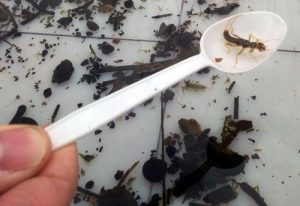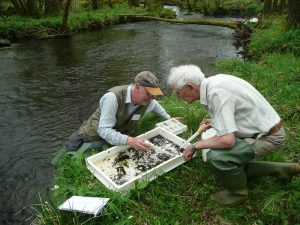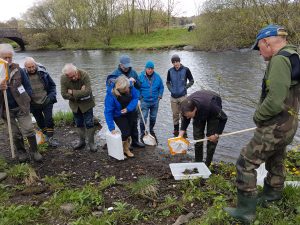Riverflies
What are Riverflies?
The Riverfly Partnership initiative focuses on three key groups of riverflies: the up-wing flies or mayflies(Ephemeroptera), caddisflies or sedges (Trichoptera) and stoneflies (Plecoptera) in rivers our rivers and becks.
 Riverflies live most of their lives as larvae on the bed of rivers and still waters, emerging as short-lived adult flies mostly in spring and summer, often en masse. Spectacular hatches can trigger fish feeding frenzies. Fly fishermen study and imitate the adults in their artificial lures.
Riverflies live most of their lives as larvae on the bed of rivers and still waters, emerging as short-lived adult flies mostly in spring and summer, often en masse. Spectacular hatches can trigger fish feeding frenzies. Fly fishermen study and imitate the adults in their artificial lures.
Riverflies, along with other freshwater invertebrates, are at the heart of the freshwater ecosystem and are a vital link in the aquatic food chain. Riverfly populations are affected by many factors, predominately water quality, habitat diversity, water level and flow rate. Their common characteristics of limited mobility, relatively long life cycle, presence throughout the year and specific tolerances to changes in environmental conditions make them powerful biological indicators to monitor water quality, and are commonly referred to as ‘the canary of our rivers.’
See Anglers’ Riverfly Monitoring Initiative for further information on how angling (and other interested) groups are playing an instrumental role in protecting the health of their local rivers by monitoring their riverfly populations.
There are a total of 278 species of mayflies, caddisflies and stoneflies, of which eight species have Biodiversity Action Plan status and therefore are recognised as of priority for conservation by the government.
Riverfly Monitoring

Riverfly monitoring is a great way for anyone to get involved with surveying and protecting the health of their local rivers and becks. Not only is a it great fun, but you get to meet new people and see new places. Here at South Cumbria Rivers Trust we run a training day for new volunteers every spring; if you are interested please get in touch.
This initiative provides a simple monitoring technique which we can use to detect any severe perturbations in river water quality.  The monitoring scheme, used alongside routine monitoring by the Environment Agency ensures that water quality is checked more widely and action taken at the earliest opportunity, should any severe perturbations be detected. Furthermore having people out and about monitoring acts as a deterrent to incidental polluters.
The monitoring scheme, used alongside routine monitoring by the Environment Agency ensures that water quality is checked more widely and action taken at the earliest opportunity, should any severe perturbations be detected. Furthermore having people out and about monitoring acts as a deterrent to incidental polluters.
Read our reports from volunteers surveys.
Your contribution counts.
Do join us – there are many ways you can get involved
Join over 70 volunteers across South Cumbria, and help us protect this beautiful area. Get in touch to register your interest and we’ll let you know when the next training day is.
Learn more about freshwater life Courses on freshwaters and specific groups, e.g. riverflies, are run by The Field Studies Council and the Freshwater Biological Association
Act with environmental awareness Minimising water & other resource use and ensuring the correct disposal of waste products are critically important to the conservation and protection of our freshwater habitats.
